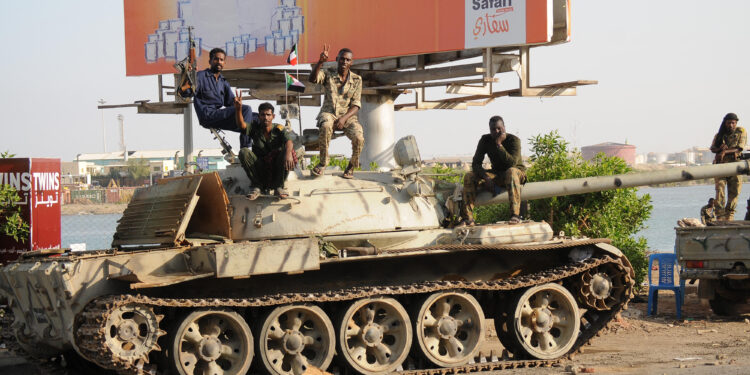A US-brokered 72-hour ceasefire between Sudan’s warring generals officially came into effect Tuesday after 10 days of urban combat killed hundreds, wounded thousands and sparked a mass exodus of foreigners.
The Sudanese Armed Forces (SAF) and the Rapid Support Forces (RSF) agreed to the ceasefire “following intense negotiations”, Secretary of State Antony Blinken said in a statement shortly before the truce took effect at midnight (2200 GMT Monday).
Previous bids to pause the conflict failed to take hold, but both sides confirmed they had agreed to the three-day halt.
“This ceasefire aims to establish humanitarian corridors, allowing citizens and residents to access essential resources, healthcare, and safe zones, while also evacuating diplomatic missions,” the RSF paramilitary tweeted.
In a statement on Facebook, the SAF said it would also abide by the ceasefire on condition its rivals did so.
UN Secretary-General Antonio Guterres warned earlier that Sudan was on “the edge of the abyss” and that the violence “could engulf the whole region and beyond”.
The fighting has pitted forces loyal to army chief Abdel Fattah al-Burhan against those of his former deputy Mohamed Hamdan Daglo, who commands the RSF.
The RSF emerged from the Janjaweed militia that then-president Omar al-Bashir unleashed in Darfur, leading to war crimes charges against Bashir and others.
The Forces of Freedom and Change, the main civilian bloc which the two generals ousted from power in a 2021 coup, said the truce would allow for “dialogue on the modalities of a permanent ceasefire.”
At least 427 people have been killed and more than 3,700 wounded, according to UN agencies.
Among the latest to die was the assistant administrative attache at Cairo’s embassy in Khartoum, Egypt’s foreign ministry said.
‘Corpses litter the streets’
The official was killed while heading from home to the embassy to follow up on evacuation procedures, it said.
More than 4,000 people have fled the country in foreign-organised evacuations that began on Saturday.
The United States and European, Middle Eastern, African and Asian nations launched emergency missions to bring to safety their embassy staff and Sudan-based citizens by road, air and sea.
But millions of Sudanese are unable to flee what is one of the world’s poorest countries, with a history of military coups.
They are trying to survive acute shortages of water, food, medicine and fuel as well as power and internet blackouts.
UN agencies reported some Sudanese civilians were able to escape “to Chad, Egypt and South Sudan”.
“We must all do everything within our power to pull Sudan back from the edge of the abyss,” Guterres said.
He had also, again, called for a ceasefire.
Britain requested an emergency UN Security Council meeting on Sudan, which was expected to take place Tuesday, according to a diplomat.
‘Unspeakable destruction’
A UN convoy carrying 700 people completed an arduous 850-kilometre (530-mile) road trip to Port Sudan on the Red Sea coast from the capital, where they left behind gunfire and explosions.
The United Nations head of mission Volker Perthes said the convoy arrived safely. A UN statement separately said he and other key staff will “remain in Sudan and will continue to work towards a resolution to the current crisis”.
With Khartoum airport disabled after battles that left charred aircraft on the tarmac, many foreigners were airlifted from smaller airstrips to countries including Djibouti and Jordan.
US special forces swooped in with Chinook helicopters Sunday to rescue diplomats and their dependents, while Britain launched a similar rescue mission.
EU foreign policy chief Josep Borrell said more than 1,000 EU citizens had been taken out during a “long and intense weekend” involving airlift missions by France, Germany and others.
China said it had “safely evacuated” a first group of citizens and would “try every means to protect the lives, properties and safety of 1,500 plus Chinese compatriots in Sudan”.
Japan said it had evacuated 45 of its nationals and their spouses and temporarily closed its embassy in Khartoum.
The capital, a city of five million, has endured “more than a week of unspeakable destruction”, Norway’s ambassador Endre Stiansen wrote on Twitter after his evacuation.
‘Nowhere is safe’
Nearly 200 people from more than 20 countries arrived in the Saudi port of Jeddah Monday night after crossing the Red Sea in a naval frigate.
“We travelled a long way from Khartoum to Port Sudan. It took us around 10 or 11 hours,” Lebanese national Suhaib Aicha told AFP as his young daughter cried on his shoulders.
“It took us another 20 hours on this ship from Port Sudan to Jeddah.”
Those Sudanese who can afford to are also fleeing Khartoum on crowded buses for the more than 900-kilometre desert drive north to Egypt.
Among the 800,000 South Sudanese refugees who previously fled civil war in their own country, some are choosing to return, with women and children crossing the border, said the UN refugee agency.
By AFP











